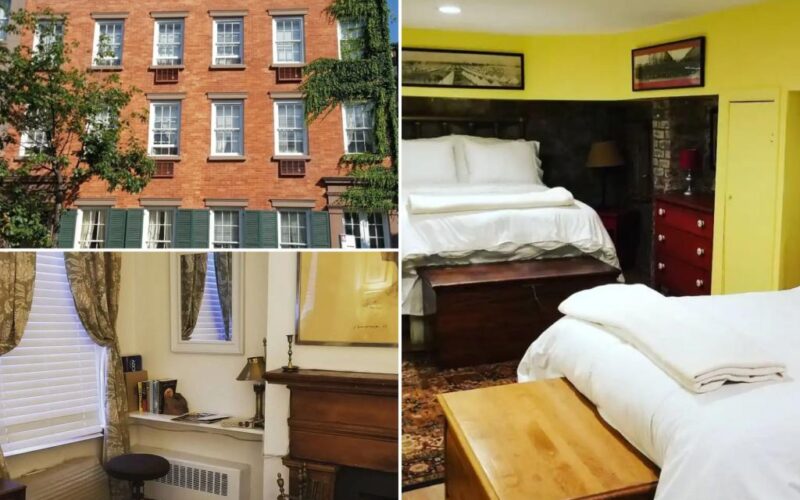A makeshift hotel in Greenwich Village that was renting out rooms on Airbnb became the first property to get sued by the city for attempting to evade its crackdown on short-term rentals.
Incentra Village House, bills itself as “The First Gay Inn in Manhattan,” ran afoul of the city’s 20-month clampdown, known as Local Law 18, for operating an illegal hotel, according to the complaint filed in State Supreme Court of New York on Monday.
The city argues that Incentra Village has flouted the law for years, lacking adequate sprinkler systems and fire alarms, proper emergency exits and illegally converted a basement to a nightly rental.
The mid-19th-century property at 30 and 32 Eighth Ave., located about a half-mile from the famed Stonewall Inn, had advertised a so-called Stonewall Room on AirBnb and other sites.
The room was “2 flights down narrow rickety stairs to a sub-basement with no window. Ceiling was so low in spots that my husband who is 6 feet tall hit his head several time,” one guest wrote on a travel website.
Another who stayed in the same room noted that “there was no means of escape, should anything happen,” according to the filing.
Last week, a TripAdvisor review showed a photo of the city’s vacate order posted on the front door. The site user noted that the room “is in a serious state of disrepair…Everything is so worn down, broken, frayed, dirty,” the filing states.
Incentra was never approved by the city to operate as a hotel because its certificate of occupancy was for permanent residences, according to the complaint.
Nevertheless, it listed 12 rooms on platforms including Airbnb, Booking.com, Expedia Group/VRBO and TripAdvisor – which all took down the listings.
Incentra operates out of two townhouses that were built in 1841 and rents out rooms for upwards of $400 a night.
It is still open for business, but appears to have taken down the listing for the basement room.
Incentra sued the city earlier this year, arguing that it has operated as a hotel for decades and that the city is unfairly denying its application to change its classification from residential to commercial.
The business did not immediately respond for comment, but an attorney for the property, Francisco Augspach, disputed the allegations to The New York Times.
“This lawsuit represents an unwarranted attack on the continuing operation of a lawful, pre-existing historic inn that has been serving The Greenwich Village community for many decades,” Augspach said.
Local Law 18 was implemented in 2023 in response to the growing number of short term rentals on sites like Airbnb that are contributing to the housing crisis, according to the city.
The regulation is known to be the most restrictive home sharing law in the world.
It requires hosts to register with the city in order to rent their apartments or homes for less than 30 days and to adhere to a strict set of rules. It limits the number of guests per unit to two and requires hosts to be present and to give guests free access to all rooms in the dwelling, barring locks on interior doors.
It has effectively eliminated 92% of the short term rentals in New York City, to about 3,000 from 22,000, and spawned a black market for home sharing, as The Post previously reported.
Airbnb argues that the city’s hotels have “benefitted the most” by Local Law 18. Room rates have risen by 5% over the past year through March, to $320 per night, according to a report the company released last week.
OSE has only issued 3,054 registrations to Airbnb hosts since 2023.
In court filings, Incentra said it is “severely constrained” and “threatened with closure and fines.”
The city wants to shut down Incentra Village and could financially cripple the business with fines that are tripled to $5,000 per unregistered short term rental each day it is rented out and more fines for continuing to market the business as a hotel.
“This illegal operation was brought to light thanks to New York City’s robust registration and verification requirements,” said Christian Klossner, executive director of OSE.
Local Law 18 “gave the city new tools to address [such] operations that seek to illegally profit off of our housing stock.”








